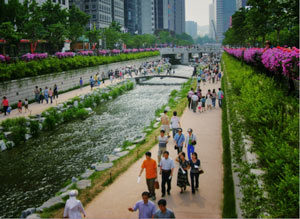Framing

Enterprising artists are offering Michigan-branded face masks via Etsy.
Recently I had the honor of presenting a lecture at the University of Michigan Biological Station in Northern Michigan. Well, it wasn’t actually at the Biostation, it was via Zoom from my home office.
I chose to talk about how we frame issues. This choice was motivated by what felt like a sense of distance and discouragement at the end of our COVID-19-motivated remote class.
The feeling of discouragement arose from many places. There were the human aspects of isolation and the psychological weight that comes from both the worries about COVID-19 as a health threat and its huge disruption to our economy. Anecdotally, at least as important to the despair was seeing the responses to COVID-19 by both our governments and our citizens.
Early on in the COVID-19 response, I heard such facile statements as, “See, the government can respond to crises. We can do the same for climate change.” It did not take long however, for the complexity of the unprecedented pandemic to be parsed into polarized political statements. False choices set the foundation for much of the public discourse, i.e., closing the economy versus saving lives. From these seeds grow all of the issues that feed conspiracies. Suddenly the scientists and politicians are carrying out broad political agendas of government control versus individual freedoms.
In my talk, I pointed out that we should expect such tactics. Progress only comes from recognizing them as tactics and eroding their effectiveness as barriers to driving change.
Live free and/or die?
I was, however, more motivated by the feelings expressed by some of my students about individuals’ responses as COVID-19 stopped the world in its tracks. They told me they were discouraged by people who dismissed wearing masks and ignored social distancing. In particular, they were frustrated by the way in which those individuals might undermine any benefit achieved by those adhering to public health guidelines. There was a transference of a feeling that we, as individuals, really do not have the ability to solve complex societal problems — at least in part, because other individuals will undo all that we can do.
First, a point. Success in fighting COVID-19 does not, in fact, require every individual to adhere to the guidelines of social distancing, wearing masks, and washing hands. It requires most of us to do this, and indeed, those who think about the availability of hospital beds consider whether or not 60 percent, 70 percent, or 80 percent follow the guidelines. By taking personal responsibility, we do gain some control over a complex problem.
How did we get here?

Cheonggyecheon is a public recreation space in Seoul, Korea. At seven miles long, this massive urban renewal project is a major success in land use to preserve and protect the environment while promoting environmental wellness.
My class ultimately is about gaining control over complex problems by first, having knowledge about the problem, and, second, having techniques to forge a solution.
So, how did we get to the situation we have with climate change?
In many ways, it was through the choices and actions made by individuals. Many of these choices have benefited us as individuals and as countries — as Americans, we need only observe our purchasing power and high standard of living. If we wanted to argue for argument’s sake, we could claim the move to using fossil fuel saved the whales (and all that whale oil) in the late 1800s.
Hence, climate change follows from the effects of myriad choices made by individuals and organizations. Solutions also, logically, arise from the myriad choices made by individuals and organizations. A difference between how we got here and how we move forward is that we have to take stock of the collective effects of all of our decisions and steer them toward beneficial outcomes.
Individual choices … collective outcomes
It’s easy to get discouraged when we don’t see the immediate benefit of a climate-friendly decision. In fact, it seems the problem only gets worse. The electric-car driver who owns a solar charging station can’t help but be frustrated by the neighbor’s choice of a 600-horsepower pickup truck.
On the other hand, we didn’t really see negative climate impacts when parents were buying new cars for their 16-year-old drivers back in the 1970s. Admit it, all parties were pretty excited about their gas guzzlers back in the day.
I do believe that solutions to our climate challenges come more from scaling up the successful strategies of individuals and organizations than top-down policy approaches. But as a society, we still tend to dream of a magical global solution; we look too much to someone to blame; too much to someone who will pay.
If nothing else, we need to accept that the individual choices we make now will accumulate into collective outcomes later. Therefore, informed, evidence-based decisions by individuals do matter.



Ay Tweddle - 1961
At 87, I am still active calling upon my Industrial Engineering degree to make a difference in addressing the Anthropogenic Climate Change Crisis.
With 2 other engineers, and blessed with just shy of $1.0 million of “Friends &Family” Angel finds, we successfully completed our Phase I “Proof of Concept” at a NASA Certified Advanced Materials lab here in WV, including producing a prototype, and developed a “disruptive” alternative to an on board system of the world’s airlines that will reduce their carbon footprint.
They average 65 ULDs on board per plan
Our prototype LD3/AKE came in at 90lbs. compared to the all aluminum units at 205lbs. A 56% weight reduction.
Engineers at the world’s largest cargo airline determined that converting to our innovation would reduce the tare weight of their Boeing 767-300ER Freighters by 7.5 tons per plane, saving them 265,000 gallons of fuel per plane per year. That would reduce the GHG emissions by 3100 tons per plane per year.
And Ed intend to operate the 72,000 sq. ft. plant on 100% solar energy!
The point of all this is that addressing the climate Change Crisis is a job creating economic opportunity.
We are now seeking capital and industrial partners to implement our next Phase II “Pilot Plant”.
Allan
Allan Tweddle BSE, MBA
Founder & Chairman
Composite Transport Technologies Canada Ltd.
Reply